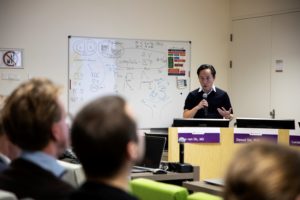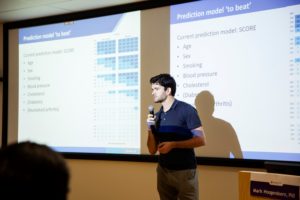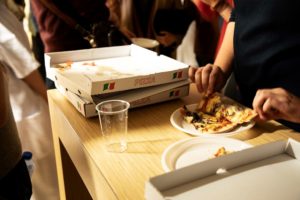Amsterdam Medical Data Science slaat brug tussen geneeskunde en datawetenschap
Op de November editie van de Amsterdam Medical Data Science bijeenkomst kwamen datawetenschappers en medische professionals samen. Bij het Amsterdam UMC deelden ze inzichten, ervaringen en onderzoeken in medische datawetenschap. Het doel van de bijeenkomsten is om de kloof tussen beide partijen te overbruggen in een informele setting met presentaties en pizza.
De host van de sessie, dr. Lucas Fleuren, introduceerde een andere bijeenkomst door een recente reis te bespreken: het 31ste jaarlijkse congres van de European Society of Intensive Care Medicine (ESICM) in Parijs. “Er was zelfs een sessie toegewijd aan machine learning binnen de intensive care afdeling. De conferentie is bewust erg klinisch, dus het is fijn om te zien dat er zelfs een toegewijde plek is met lezingen over datawetenschap en machine learning binnen intensieve geneeskunde”, licht dr. Fleuren toe. “Langzaam maar zeker vinden deze technieken hun weg naar het ziekenhuis. De kloof tussen geneeskunde en datawetenschap wordt steeds kleiner.”
Een nieuw model voor onderzoek binnen datawetenschap
De nadruk van de presentatie van Daoud Sie lag op het faciliteren van onderzoek en ontwikkeling binnen datawetenschap in medische centra. Sie werkt op de afdeling Klinische Genetica van het Amsterdam UMC en is een expert op het gebied van moleculaire biologie, bioinformatica en IT-infrastructuren. Sie begon zijn presentatie door de aanwezigen zelf vast te laten stellen dat er “veel meer te winnen valt” door big data te gebruiken in medische settings. Hij voegde daar een citaat uit het overheidsrapport Kennisagenda Personalised Medicine aan toe: “We hebben substantiële investeringen nodig voor een solide data-infrastructuur alsook voor de middelen om nieuwe technieken en methodologieën te ontwikkelen.”
Samen met zijn collega dr. Martijn Steenwijk ontving Sie een innovatiesubsidie van het Amsterdam UMC. Daarmee ontwikkelen ze een duurzame manier die onderzoekers moet helpen om datawetenschap studies eenvoudiger mogelijk te maken. De doelstelling van het plan is om verschillende uitdagingen te overwinnen waar ziekenhuizen en academisch medisch centra voor staan op het gebied van medische datawetenschap. Denk daarbij aan dataprivacy, IT-infrastructuren, en beleidsmakers voorlichten over de uitdagingen, oplossingen en de potentiële voordelen van deze studies.

Nieuwe connecties voor kennisuitwisseling creëren
Na zijn presentatie zei Sie dat hij hoopt dat het model waar hij aan mee heeft gewerkt, overgebracht kan worden naar andere medische centra. “Dat is absoluut het plan. We zijn naar andere UMC’s gegaan om te onderzoeken wat zij daar deden. We zagen vaak een tweedeling tussen onderzoek en het ziekenhuis zelf”, lichtte Sie toe. “Onze aanpak richt zich op dat oplossen door afdelingen te verbinden – de IT-afdeling en de afdeling Business Intelligence, als u wilt – en organisaties te verbinden. Dat zal niet van vandaag op morgen gebeuren, maar we hebben nu de roadmap om daar hopelijk te komen.”
Problemen voorkomen met Doktoren en Datawetenschappers
De tweede presentatie was van dr. Hine van Os van de afdeling Neurologie aan het Leids Universitair Medisch Centrum (LUMC). Hij werkt momenteel aan een machine learning model om huisartsen te helpen met risicobeoordelingen van beroertes onder vrouwen. Tijdens de presentatie richtte hij zich op de epidemiologische implicaties van zijn studie waarvoor hij data van meer dan twee en een half miljoen patiënten gebruikt. Dr. Van Os onderstreepte het belang om altijd bewust te blijven van verborgen systemische vooringenomenheid in data tijdens het werken aan een machine learning model. 
Na zijn presentatie noemde dr. Van Os twee zaken zoals de Amsterdam Medical Data Science bijeenkomst enorm belangrijk: “De overeenstemming tussen doktoren, datawetenschappers en meewerkende wetenschappers zoals epidemiologen en statistici, is op het moment verre van optimaal,” zei Van Os, “en dat kan resulteren in fouten in machine learning modellen, of in het publiceren van modellen met tekortkomingen.”
Grote successen in een korte tijd
Na de presentaties kwamen de aanwezigen op een ongedwongen manier met elkaar in contact onder het genot van pizza en frisdrank. Reflecterend op het succes van het evenement, gaf dr. Fleuren aan dat recente edities al hebben bijgedragen aan het ontstaan van nieuwe onderzoeksprojecten en connecties tussen datawetenschappers en medische professionals: “Het is nog maar de vierde editie, maar de Amsterdam Medical Data Science bijeenkomsten zijn al een groot succes. De meetups helpen datawetenschappers, doktoren en medische professionals om in contact te komen met elkaar en om elkaar te leren kennen. De presentaties zijn geweldig, maar naderhand komen bezoekers samen met pizza. Dat heeft volgens mij de meeste toegevoegde waarde. Er zijn al veel mensen die ons hebben verteld dat ze elkaar hier hebben leren kennen en zijn gaan samenwerken. Daarnaast ontvangen we veel e-mails van professionals die betrokken willen zijn bij nieuwe projecten.”
De bijeenkomst vindt iedere derde dinsdag van de maand plaats in het VU University Medical Center gebouw in Amsterdam. De volgende editie vindt plaats op 18 december 2018.
Over Amsterdam Medical Data Science
De bijeenkomsten van de Amsterdam Medical Data Science worden ondersteund door Right Data Right Now, een consortium bestaande uit Amsterdam UMC, OLVG, Vrije Universiteit Amsterdam, Pacmed en de Amsterdam Economic Board.
Tekst: Alex Hibbert – Edenfrost | Fotografie: Brenda de Vries
23 november 2018
Meer weten over
Neem contact op
Blijf jij ook op de hoogte?
8x per jaar nieuws en events uit de regio: schrijf je in voor de Board Update nieuwsbrief
Deel dit artikel
Wil je op de hoogte blijven?
Volg ons dagelijks op LinkedIn en schrijf je in voor de Board Update nieuwsbrief.
Lees ook deze berichten
- Een nieuwe lichting gedreven jongeren is aangetreden bij Young on Board, de ...
- Met de selectie van vier kanshebbers is de regionale voorronde van de ...
- Met meer dan 80 ondernemers, 40 investeerders en diverse dienstverleners bood LSH Capital Match ...


